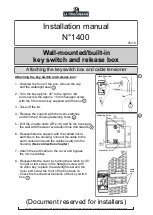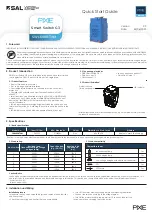
Publication date: Sept, 2015
Revision A1
70
RADIUS-‐Assigned QoS Enabled :
When RADIUS-‐Assigned QoS is both globally enabled and enabled (checked) on a given port, the
switch reacts to QoS Class information carried in the RADIUS Access-‐Accept packet transmitted by
the RADIUS server when a supplicant is successfully authenticated. If present and valid, traffic
received on the supplicant's port will be classified to the given QoS Class. If (re-‐)authentication fails
or the RADIUS Access-‐Accept packet no longer carries a QoS Class or it's invalid, or the supplicant is
otherwise no longer present on the port, the port's QoS Class immediately reverts to the original
QoS Class (this may be changed by the administrator in the meanwhile without affecting the
RADIUS-‐assigned).
This option is only available for single-‐client modes, i.e.
• Port-‐based 802.1X
• Single 802.1X
RADIUS attributes used in identifying a QoS Class:
Refer to the written documentation for a description of the RADIUS attributes needed in order to
successfully identify a QoS Class. The User-‐Priority-‐Table attribute defined in RFC4675 forms the
basis for identifying the QoS Class in an Access-‐Accept packet.
Only the first occurrence of the attribute in the packet will be considered, and to be valid, it must
follow this rule:
• All 8 octets in the attribute's value must be identical and consist of ASCII characters in the range
“0”-‐ “3”, which translates into the desired QoS Class in the range 0–3.
RADIUS-‐Assigned VLAN Enabled:
When RADIUS-‐Assigned VLAN is both globally enabled and enabled (checked) for a given port, the
switch reacts to VLAN ID information carried in the RADIUS Access-‐Accept packet transmitted by
the RADIUS server when a supplicant is successfully authenticated. If present and valid, the port's
Port VLAN ID will be changed to this VLAN ID, the port will be set to be a member of that VLAN ID,
and the port will be forced into VLAN unaware mode. Once assigned, all traffic arriving on the port
will be classified and switched on the RADIUS-‐assigned VLAN ID.
If (re-‐)authentication fails or the RADIUS Access-‐Accept packet no longer carries a VLAN ID or it’s
invalid, or the supplicant is otherwise no longer present on the port, the port’s VLAN ID
immediately reverts to the original VLAN ID (this may be changed by the administrator in the
meantime without affecting the RADIUS-‐assigned).
This option is only available for single-‐client modes, i.e.
• Port-‐based 802.1X
• Single 802.1X
For troubleshooting VLAN assignments, use the "Monitor→VLANs→VLAN Membership and VLAN
Port" pages. These pages show which modules have (temporarily) overridden the current Port
VLAN configuration.
RADIUS attributes used in identifying a VLAN ID:
RFC2868 and RFC3580 form the basis for the attributes used in identifying a VLAN ID in an
Access-‐Accept packet. The following criteria are used:
• The Tunnel-‐Medium-‐Type, Tunnel-‐Type, and Tunnel-‐Private-‐Group-‐ID attributes must all be
present at least once in the Access-‐Accept packet.
• The switch looks for the first set of these attributes that have the same Tag value and fulfill the
following requirements (if Tag = 0 is used, the Tunnel-‐Private-‐Group-‐ID does not need to include a
Tag):
-‐ Value of Tunnel-‐Medium-‐Type must be set to "IEEE-‐802" (ordinal 6).
-‐ Value of Tunnel-‐Type must be set to "VLAN" (ordinal 13).
-‐ Value of Tunnel-‐Private-‐Group-‐ID must be a string of ASCII chars in the range '0' -‐ '9', which is
interpreted as a decimal string representing the VLAN ID. Leading '0's are discarded. The final value
must be in the range 1–4095.
Summary of Contents for LPB2910A
Page 7: ...Publication date Sept 2015 Revision A1 ii ...
Page 65: ...Publication date Sept 2015 Revision A1 53 SMTP Enable Select this Group Name in SMTP ...
Page 69: ...Publication date Sept 2015 Revision A1 57 The number of data to be saved in the RMON ...
Page 74: ...Publication date Sept 2015 Revision A1 62 ...
Page 278: ...Publication date Sept 2015 Revision A1 266 Refresh Click to refresh the page ...
Page 365: ...Page 353 Figure 9 21 Restore Configuration option ...
















































